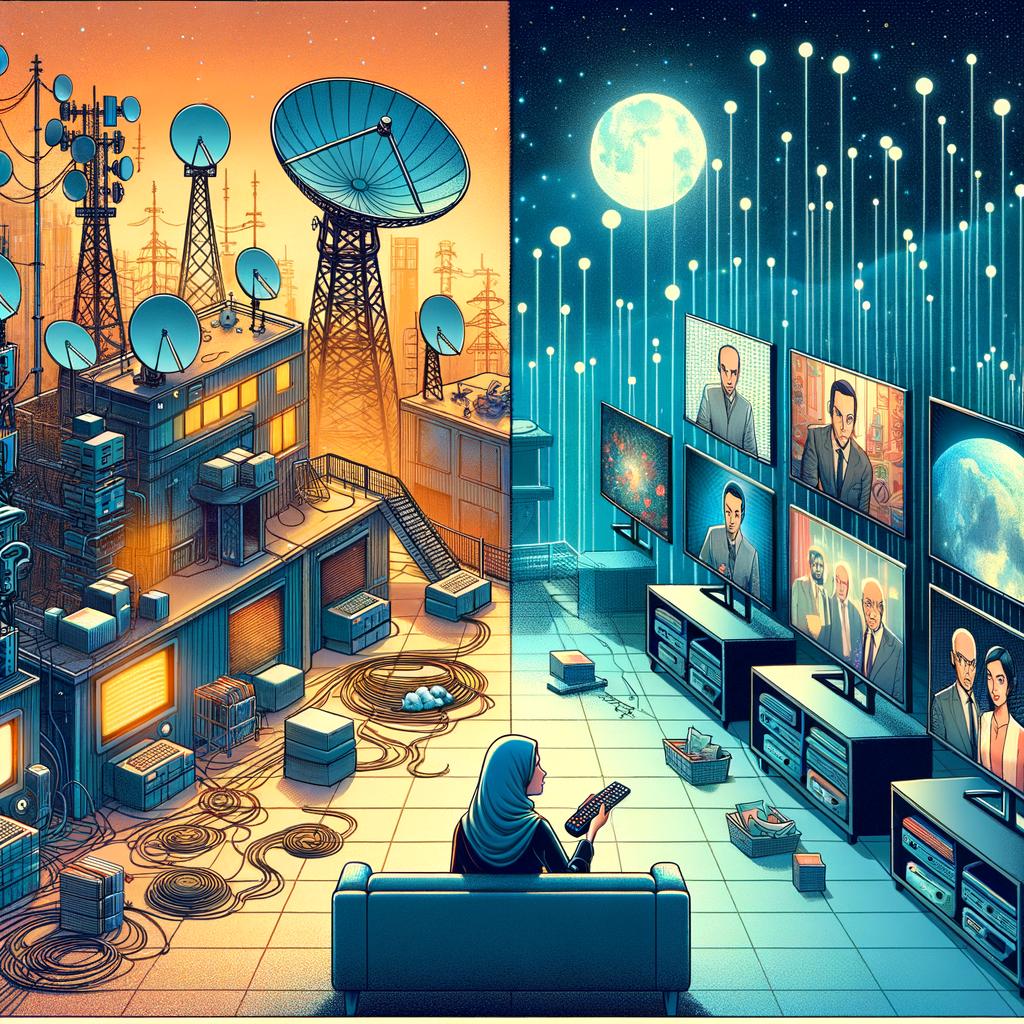
Title: Riding the Crest of the IPTV Wave: Unleashing a New Era for Cable and Satellite TV
Introduction:
In a world where technology knows no bounds, a sweeping tidal wave is reshaping the realm of cable and satellite television as we know it. Brace yourselves, for the advent of Internet Protocol Television (IPTV) is upon us – a transformative force that is unraveling the traditional entertainment landscape and offering us a glimpse into a dazzling future.
Gone are the days of being enslaved by cable packages bundling countless channels, most of which go unwatched; behold the age where consumers are reclaiming the power to personalize their viewing experience, and to surf the digital airways with unparalleled control. With a blend of creativity and neutrality, this article delves into the disruptive force behind the IPTV wave, unearthing captivating details that shed light on its potential to revolutionize our TV experience.
Neutralizing the sway traditionally held by cable and satellite providers, IPTV employs streaming technology to deliver television programming via an internet connection. This cutting-edge solution enables viewers to not only sift through an extensive selection of channels but also to handpick their preferred content, embracing a much-needed liberation from a landscape of endless reruns and mind-numbing infomercials.
What sets IPTV apart from its predecessors is its seamless integration of telecommunications, high-speed internet, and multimedia services onto a unified platform. Harnessing the seemingly limitless capabilities of the internet, this innovative medium empowers consumers by bridging the gaps between traditional TV, video-on-demand services, and interactive media, captivating imaginations and eradicating the hurdles of conventional broadcasting.
Revolutionizing the TV experience, IPTV brings forth an era where viewers have the power to dictate what, when, and how they watch. A plethora of exciting features accompany this wave of change, from time-shifting capabilities that allow for pausing or rewinding live television to on-demand libraries packed with an abundance of movies, series, and documentaries. The freedom to create personalized playlists and the ease of accessing an international array of channels are no longer mere figments of futuristic fantasies; they have become our present-day entertainment reality.
The journey into the depths of the IPTV wave has just begun, and this article seeks to navigate these uncharted waters by exploring the heart of this transformative technology. From the dazzling advancements in streaming quality to the implications for broadcasters, content creators, and consumers, we will uncover the full potential of IPTV and the dramatic shifts it brings to the television landscape.
So, get ready to ride this crest of immense change, as we embark on a captivating voyage into the depths of the IPTV wave. Step into a world where entertainment meets innovation and discover the myriad possibilities of a digital frontier reimagined, only possible through the power of Internet Protocol Television.
Table of Contents
- The Future of Television: Embracing IPTV Technology
- Unleashing New Possibilities: How IPTV is Transforming the Cable and Satellite TV Landscape
- Exploring the Benefits: Advantages and Drawbacks of IPTV for Consumers
- Making the Switch: Practical Recommendations for Transitioning to IPTV
- Q&A
- Wrapping Up
The Future of Television: Embracing IPTV Technology

With the advent of Internet Protocol Television (IPTV), viewers are being ushered into a new era of television consumption. This cutting-edge technology is transforming the way we watch our favorite shows, merging the worlds of cable and satellite TV with the power and convenience of the internet. The IPTV wave is revolutionizing the industry, offering viewers a more personalized and immersive television experience like never before.
One of the key advantages of IPTV is its unparalleled flexibility. With traditional cable and satellite TV, viewers are bound by preset schedules and limited choices. However, IPTV liberates viewers, providing them with a wide range of options. They can now watch their favorite shows whenever and wherever they want, thanks to the technology’s ability to stream content over the internet. Gone are the days of being tied to the living room couch, as IPTV allows viewers to access their favorite TV channels and on-demand content on multiple devices, such as smart TVs, smartphones, tablets, and even game consoles.
| Benefits of IPTV | Traditional TV | IPTV |
|---|---|---|
| Flexibility | Limited schedules and choices | On-demand content, multiple device access |
| Cost | Expensive subscription packages | Flexible pricing plans, pay for what you watch |
| Personalization | Static channel lineup | Customizable channel selection |
Moreover, IPTV offers a more cost-effective solution compared to traditional TV. While cable and satellite subscriptions often come with high costs and rigid package choices, IPTV provides consumers with flexible pricing plans. Viewers can now pay for exactly what they want to watch, eliminating the need for costly bundles that include unnecessary channels. This customization allows for a more budget-friendly option, catering to the individual preferences of every viewer.
The rise of IPTV technology has brought about a revolution in the world of television. Its flexibility, personalization, and cost-effectiveness have made it a preferred choice for millions of viewers worldwide. As IPTV continues to evolve, we can expect even more innovative features that will further enhance our TV-watching experience.
Unleashing New Possibilities: How IPTV is Transforming the Cable and Satellite TV Landscape

In today’s digital age, the world of television is being reshaped by the rising surge of Internet Protocol Television (IPTV). This groundbreaking technology is proving to be a game-changer, revolutionizing the cable and satellite TV landscape as we know it. With its ability to deliver content through the internet, IPTV is unleashing new possibilities and transforming our viewing experiences.
One of the key advantages of IPTV is its unmatched flexibility. Unlike traditional cable and satellite TV, which requires the installation of physical infrastructure, IPTV operates through an internet connection. This means that users can access their favorite TV shows, movies, and sports events anytime, anywhere, using any compatible device. Whether it’s a smart TV, smartphone, tablet, or computer, the convenience of IPTV empowers viewers to enjoy their preferred content on their terms.
- Endless Content Choices: With IPTV, users gain access to a vast array of on-demand content. From popular TV series and movies to live sports events and international channels, the possibilities are virtually limitless.
- Enhanced Interactivity: IPTV takes user engagement to the next level. Through interactive features such as video-on-demand, pause, rewind, and fast-forward capabilities, viewers have more control over their viewing experiences.
- Cost-Effective Solutions: The deployment of IPTV eliminates the need for costly infrastructure. Service providers can leverage existing internet connections to offer affordable TV packages, making quality entertainment accessible to a wider audience.
| Benefit | Description |
|---|---|
| Global Reach | IPTV transcends geographical barriers, allowing users to enjoy content from around the world. |
| Personalized Recommendations | IPTV platforms utilize advanced algorithms to provide tailored content suggestions based on viewers’ preferences and viewing history. |
| Effortless Installation | Thanks to its internet-based nature, setting up an IPTV subscription is hassle-free and doesn’t require extensive technical expertise. |
Exploring the Benefits: Advantages and Drawbacks of IPTV for Consumers

IPTV, or Internet Protocol Television, is a game-changer in the world of entertainment. This innovative technology has revolutionized the way we consume cable and satellite TV, offering a wide range of benefits for consumers. One of the primary advantages of IPTV is its accessibility. Unlike traditional cable or satellite services, IPTV allows users to stream their favorite shows and movies directly over the internet. This means that viewers can enjoy their favorite content anytime, anywhere, as long as they have a stable internet connection. Whether you are at home, at the office, or even on the go, IPTV ensures that you never miss an episode or a live event.
Another significant advantage of IPTV is its cost-effectiveness. With traditional cable or satellite subscriptions, consumers often find themselves paying for channels or packages they never watch. With IPTV, however, users have the freedom to choose from a variety of content packages tailored to their preferences. This means that you only pay for the channels and programs that interest you, saving you money in the long run. Additionally, IPTV offers features such as on-demand content and DVR capabilities, allowing users to watch their favorite shows at their convenience and even record them for later viewing.
Making the Switch: Practical Recommendations for Transitioning to IPTV

Gone are the days of cable and satellite dominating the television landscape. With the rise of IPTV, an innovative technology that delivers television programming over the Internet, viewers now have a whole new world of entertainment at their fingertips. This exciting wave of IPTV is revolutionizing the way we consume television content, offering flexibility, convenience, and endless possibilities.
Transitioning to IPTV may seem like a daunting task, but fear not! We have compiled a list of practical recommendations to help you make the switch seamlessly. First and foremost, ensure a stable and high-speed internet connection is in place. IPTV relies on a strong internet connection to deliver the content smoothly, so it’s crucial to have a reliable service provider and a network that can handle the streaming demands.
- Choose the right IPTV service provider: Do your research and select a reputable IPTV service provider that offers a wide range of channels and a user-friendly interface.
- Upgrade your hardware: Consider investing in a smart TV or an IPTV box to enhance your viewing experience. These devices are designed to support IPTV and provide seamless integration with the service provider.
- Explore different content packages: IPTV offers various content packages that cater to different interests and preferences. Take the time to explore the available options and choose the package that suits your needs.
Additionally, don’t forget to ensure that your devices are compatible with IPTV. Most modern devices, such as smartphones, tablets, and computers, support IPTV apps, allowing you to watch your favorite shows on-the-go. Embrace the freedom of streaming and enjoy the benefits of IPTV!
Q&A
Q: What is IPTV?
A: IPTV stands for Internet Protocol Television, which is a system that delivers television programming and video content using an Internet Protocol (IP) network.
Q: How does IPTV work?
A: Instead of traditional satellite or cable transmission methods, IPTV uses your internet connection to stream television channels and on-demand content directly to your device.
Q: What are the advantages of IPTV over traditional cable and satellite TV?
A: IPTV offers numerous benefits, including a wider range of channels, better picture and sound quality, interactive features, on-demand content, and the ability to watch TV on multiple devices simultaneously.
Q: Can I watch IPTV on any device?
A: Yes, IPTV can be accessed from a variety of devices, such as Smart TVs, smartphones, tablets, or computers. However, it is important to check for IPTV compatibility with your specific device before subscribing to a service.
Q: Are there any geographical limitations to IPTV?
A: Unlike traditional cable or satellite TV, IPTV is not bound by geographical limitations. As long as you have a stable internet connection, you can access IPTV services from anywhere in the world.
Q: How does IPTV affect cable and satellite providers?
A: The rise of IPTV has posed challenges to traditional cable and satellite providers, as it offers a more flexible and affordable alternative. This has prompted cable and satellite providers to adapt and offer their own IPTV services to remain competitive.
Q: What subscription options are available for IPTV?
A: IPTV services usually offer various subscription packages, ranging from basic plans with limited channels to comprehensive packages with a wide selection of channels and on-demand content. Pricing varies depending on the provider and the package chosen.
Q: Is IPTV legal?
A: While IPTV technology itself is legal, the legality of using certain IPTV services to access copyrighted content may vary depending on your jurisdiction. It is important to research and abide by the laws governing IPTV usage in your country.
Q: What is the future of IPTV?
A: The future of IPTV looks promising, with increasing demand for streaming services and advancements in technology. As more people cut the cord and switch to IPTV, it is anticipated that providers will continue to improve and innovate their offerings to cater to evolving viewer preferences.
Wrapping Up
As the IPTV wave crashes upon our screens, it leaves a profound impact on the way we consume entertainment. The revolutionizing power of Internet Protocol Television has transformed the traditional cable and satellite TV landscape, offering a new frontier of possibilities.
Gone are the days of limited channel lineups and rigid scheduling. IPTV has paved the way for an era where viewers can seamlessly stream their favorite shows, movies, and sports events, whenever and wherever they desire. With a vibrant array of on-demand content, IPTV not only democratizes entertainment but also offers a personalized viewing experience like never before.
But the influence of IPTV stretches far beyond individual experiences. It has brought significant changes to the television industry as a whole. Cable and satellite providers are forced to adapt to this shifting landscape, exploring ways to harness the potential of IPTV and maintain their relevance in an ever-evolving digital world.
Moreover, the IPTV wave has also provided a platform for a multitude of independent content creators, giving them an opportunity to showcase their work to a global audience. This newfound accessibility has not only expanded the horizons of content creation but also opened doors to diverse voices and perspectives that were previously unheard.
Amidst this transformative tide, challenges and debates have arisen—pertaining to copyright issues, regulation, and the sustainability of traditional broadcasting methods. Yet, as history has shown, evolution is inevitable, and with it comes the promise of progress.
With every passing day, the IPTV wave surges forward, captivating viewers, transforming industries, and empowering creators. It is a wave that cannot be ignored or underestimated, for it has the power to reshape the very foundations upon which our television ecosystem is built.
As we ride this wave, let us navigate its currents with caution and curiosity, embracing the unlimited possibilities it presents. For in this era of IPTV, the future of television lies in our hands, and it is up to us to harness its immense potential and steer it towards a realm where entertainment knows no boundaries.
